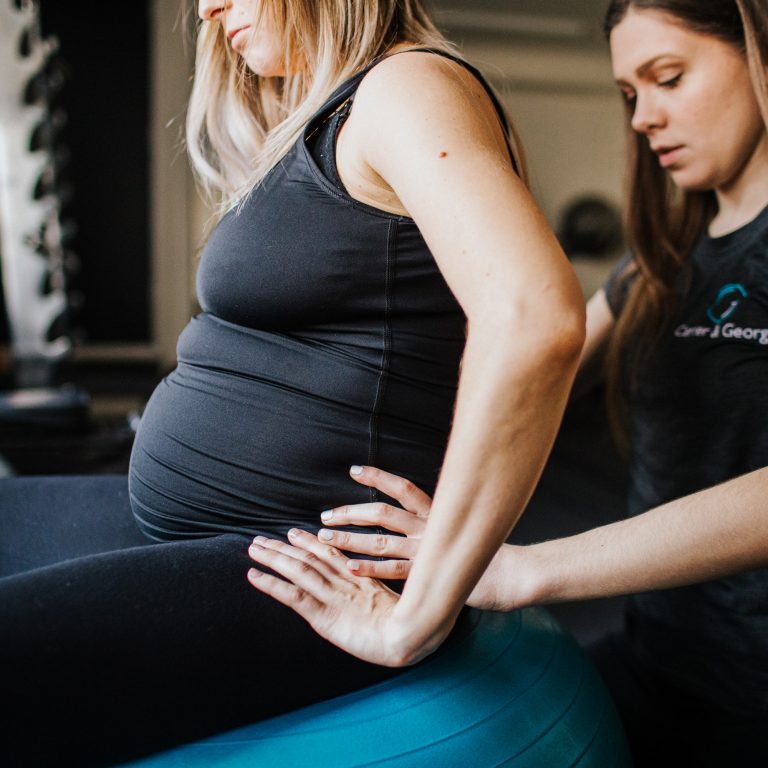Up to 50% of women experience problems with their abdominal and pelvic floor muscles after pregnancy but many women tolerate these problems as they are too embarrassed to seek help or simply don’t know that there are services available to help. Pelvic Health Physiotherapy is a specialist area in which women’s health Physiotherapists operate. The most common assessment they do is the Mummy MOT, as part of a postnatal physiotherapy assessment.
The Mummy MOT is a specialist postnatal examination designed for women who have given birth – no matter how long ago! The assessment is performed by a specialist women’s health Physiotherapist. The Mummy MOT specialist will begin with a detailed discussion about your pregnancy journey, followed by a thorough examination of both your abdominal muscles and your posture – as well as your pelvic floor and your general function. There may be a requirement for an internal examination, however you can refuse this if you feel uncomfortable, and it will be discussed with you in detail if it is required.
The first assessment takes around 1 hour. This can be carried out as early as 6-8 weeks after giving birth, usually after your 6-8 week check with your GP. Some women come for the Mummy MOT just to make sure that everything is working well but the initial assessment can be followed up with a personalised treatment programme of pelvic floor rehabilitation if pelvic health problems are identified.
The Mummy MOT may identify areas of weakness, tightness or dysfunction – and the physio will work with you in designing a realistic treatment plan to get you pain free and feeling confident in your body, and how it performs.
Your personal postnatal physio treatment programme will depend on the outcome of your initial assessment and your personal, lifestyle and fitness goals. Common components of a treatment programme include soft tissue techniques, taping, acupuncture, physiotherapy for pelvic pain, strengthening of your tummy muscles and pelvic floor, specific pelvic floor exercises and staged functional exercises.
Pelvic Girdle Pain
Pelvic girdle pain (PGP) refers to discomfort or pain in the pelvic region, specifically around the joints that connect the spine to the pelvis. This condition is common during pregnancy due to hormonal changes that affect the ligaments and muscles supporting the pelvic joints.
The pain is often felt in the lower back, hips, and buttocks, and it can range from mild discomfort to severe pain, affecting mobility and daily activities. Proper diagnosis and management, including exercises, physical therapy, and lifestyle adjustments, are essential for addressing pelvic girdle pain and improving overall well-being.
Diastasis Recti
Diastasis recti is a condition characterized by the separation of the abdominal muscles, specifically the rectus abdominis, which are the muscles forming the six-pack. This separation occurs when the connective tissue between the muscles stretches, often due to factors such as pregnancy, rapid weight gain, or improper abdominal exercises.
Commonly experienced by pregnant women, diastasis recti can lead to a visible bulge in the midsection and may contribute to lower back pain and core instability. While it is a natural part of pregnancy, addressing diastasis recti involves targeted exercises to strengthen the abdominal muscles and close the gap. Physiotherapy and guided postpartum fitness regimens are often recommended to manage and improve diastasis recti.
Our Women’s Health Physiotherapist
Aby Tobin
Who should get a Mummy MOT Assessment?
Mums of all ages!
Common reasons for a Mummy MOT often include:
- General post-natal MOT for pelvic health
- Women developing pelvic pain
- Joint pains (common examples include knee/hip/pelvic or back pain)
- Spinal Pain during/after pregnancy
- To discuss Physiotherapy for incontinence (including stress incontinence) problems, bladder and bowel incontinence, pelvic floor strength and related pelvic floor issues
- Vaginal or Pelvic organ prolapse
- Sexual concerns
- Diastasis separation checks/rehabilitation of stomach muscles (tummy gap assessment)
- Return to exercise queries
Our clinics in Hertford and Radlett in Hertfordshire are able to perform Women’s Health and Mummy MOT assessments.
Please note that our Women’s Health Physiotherapy Service is extremely busy and we are usually unable to offer same day appointments. Please book in advance if you can.
If you are unsure where to start, contact us and speak with one of our physiotherapists or sports medicine specialists – who will point you in the right direction.
Useful Links:

